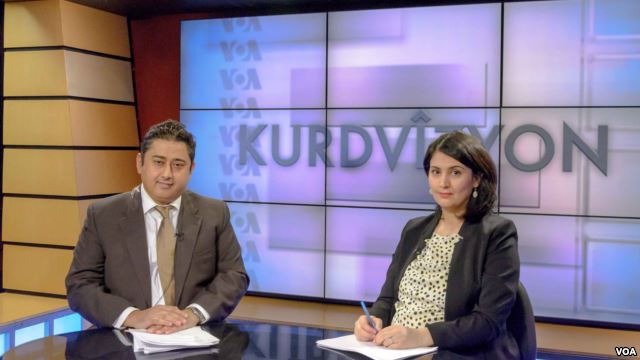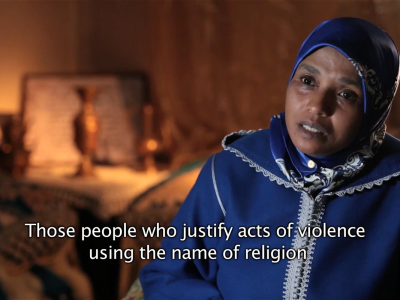Raise Your Voice
Middle East Broadcasting Network’s Raise Your Voice campaign continued to amplify and provide a platform for moderate voices to disavow extremism through television, radio, and digital (web, social media, mobile). Raise Your Voice encourages Iraqi citizens to speak out and address extremism and the underlying causes of terrorism. By identifying and discussing the issues ISIS is exploiting, Iraqis can propose solutions that will ultimately undermine ISIS’s narrative.
The Raise Your Voice social media properties, call-in radio and television shows, and other television programming provide forums for activists, youth and others to share their ideas on topics such as sectarian relationships, religious freedom and freedom of expression. New Alhurra programming offered powerful personal testimonies that reveal the realities of life in ISIS territory and the pain and suffering ISIS inflicts on families and communities.
The Raise Your Voice digital component amplifies moderate voices addressing the underlying issues that lead to extremism, such as unemployment, religious intolerance and lack of rights for women and minorities. The social media properties encourage interaction and engagement from Iraq and across the region. Community managers provoke and moderate discussion on social media platforms.
The Raise Your Voice television and radio call-in shows serve as a platform to discuss and debate the effects of terrorism, extremism and intolerance. The daily radio call-in show and weekly television call-in show invite discourse with the hosts, guests in Baghdad, and each other. Other television shows showcase local acts of heroism in confronting these challenging times; offer the view from Northern Iraq; profile families who have had their lives changed by ISIS; and provide a platform for the perspectives of NGOs, Iraqi students, and academia on current challenges and the future.
MBN is directly working to counter violent extremism, its ideology and messaging through its Raise Your Voice campaign. As a result of its established credibility, MBN is poised to play a critical role in the growth of civil society and counter extremist ideology and misinformation.
According to surveys from international research organizations such as Gallup, 44 percent of all Alhurra viewers in Iraq say they saw something on the television network that led them to think differently about ISIS.
New programming

VOA Kurdish developed new television programming focused on U.S. policies toward the region, addressed ISIS disinformation in collaboration with key affiliates in northern Iraq and Turkey, and expanded social media content for its web and Facebook sites. As a result, VOA Kurdish Facebook likes have increased by more than 600 percent in FY 2016, and the service has experienced audience growth in Iraqi Kurdistan.
Extremism Watch Desk
In 2016, VOA’s Extremism Watch Desk developed content that dispels the myths associated with ISIS. The Desk is staffed with writers proficient in 13 languages who work closely with VOA’s language services to adapt stories for worldwide radio, television and social media distribution. The Desk monitors extremism-related news around the world and takes an in-depth look at the stories behind the headlines.
Salafism in the Balkans
RFE/RL Balkan Service reported on a rising tide of extremists from Kosovo and Bosnia traveling to Iraq and Syria to fight with ISIS. Kosovo is considered the biggest per capita source of foreign fighters in Europe.
The Salafist communities producing these fighters are closed to any kind of media presence. RFE/RL Balkan Service broke through the isolation, convincing Bosnian Salafis to talk about their lives and their community for a 30-minute documentary that aired in September 2016 on 30 TV stations in Bosnia.
In October 2016, the Balkan Service also reported on two former foreign fighters opening a tolerance center in Pristina to prevent anyone else from going to fight alongside ISIS.
VOA’s Albanian and Bosnian services covered the full spectrum of the Balkans’ exposure to extremism. A VOA stringer also captured exclusive coverage of the experience of Salafis living in the village of Gornja Maoca, a Balkan hotbed of extremism—he was the only journalist to have spent a night there.
Fighting stereotypes
The VOA Urdu Service’s hit show Not Your Ordinary Imam presents American imams who shatter stereotypes. Featured imams include one who has become incredibly popular with youth, another who ensures that his mosque and its services are open to non-Muslims, and a third who coaches youth in boxing to keep them off the crime-ridden streets of their Philadelphia neighborhoods.
Raise Your Voice tackled the topic of stereotypes and featured compelling interviews, such as an interview with Aicha al-Saadi, a high school student in Texas, who talked about her experience wearing the headscarf. Alhurra also aired an examination of the most prevalent stereotypes about Muslims in America that included an interview with a Muslim radio host who spoke about common misconceptions that fuel Islamophobia and hostility.
Special reporting
During 2016, RFE/RL Afghan Service (Radio Azadi) remained a leading credible source of news, reporting, analysis, and debates in Afghanistan on the atrocities committed by ISIS. Radio Azadi produced more than 130 reports on the terrorist group’s activities and attacks and received hundreds of messages, phone calls and comments about its reporting.
In early 2016 the Radio Azadi’s ISIS coverage concentrated on the eastern Nangarhar Province, where government forces and local volunteers fought hard to reclaim parts of the six districts lost to ISIS extremists in 2015. After ISIS had been chased out of Nangarhar, Radio Azadi led Afghan media in reporting on the new ISIS safe havens in the eastern Kunar and Nuristan Provinces.
RFE/RL’s Radio Mashaal continuously demonstrates its impact as a critical source of news and an alternative to extremist propaganda for Pashtuns in Pakistan’s Federally Administered Tribal Areas. In October 2016, through its vast contact network, Mashaal was first to receive and air a letter from the former head of the Afghan Taliban’s head of Qatar office, Sayed Taib Agha, which called upon Taliban leadership to end activities in Pakistan and to cease the destruction of public properties. This story was also quoted by more than 20 western media outlets, including The New York Times and The Washington Post.
In December, VOA Somali sent a reporter to Columbus, OH to cover the aftermath of the attack at Ohio State University in which a Somali-born student injured 11 people. The reporter visited the largest Somali mosque in Columbus and reported on community leaders and parents’ efforts against online extremism and efforts to radicalize and recruit their children.
“I live under the control of ISIS here in Hawija. I go to the upper floor to listen and participate in (Raise Your Voice call-in radio show). If Daesh catches me, they would kill me.”
— Call-in radio listener

Invisible Enemy
In 2016 Alhurra Television produced The Invisible Enemy, a three-part documentary series that took an in-depth look at what Moroccan citizens are doing to counter violent extremism.
The documentary series examines the role that Morocco plays in the regional and international fight against terrorism and how government and community leaders are taking steps to eradicate the roots of terrorism in the North African country. The Invisible Enemy follows key members of Moroccan society as they address what they are doing to fight extremist ideologies. This includes the founder of the cultural center in Sidi Moumen, a region of Casablanca known for producing extremists. The series also interviews a boxing coach from Casablanca, a Sheikh of the Salafi movement and experts in Islamic studies.
The Invisible Enemy is the latest Alhurra production that focuses on countering violent extremism. The network’s award-winning documentary series Delusional Paradise examined life under ISIS and the destruction it has created across the region.




